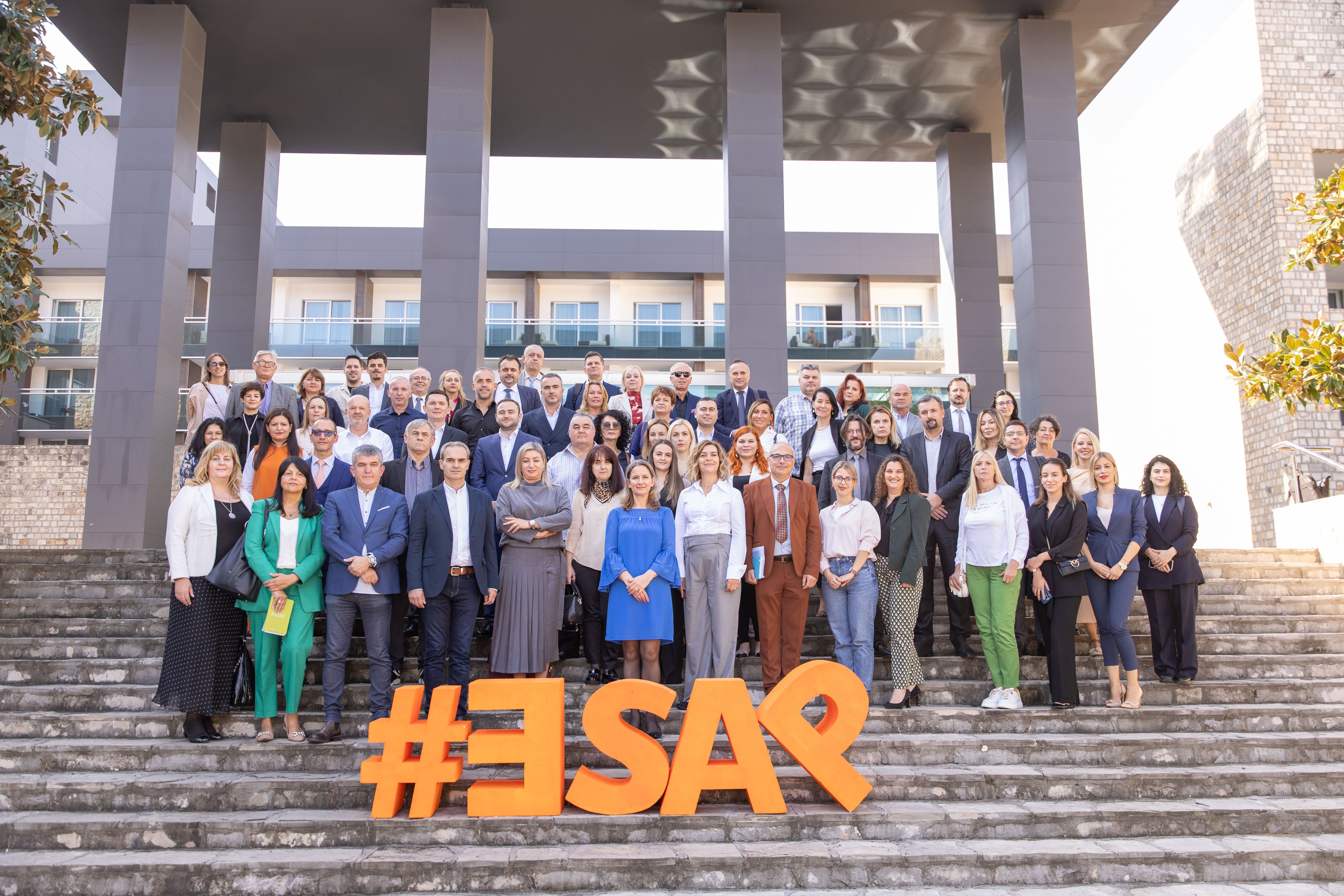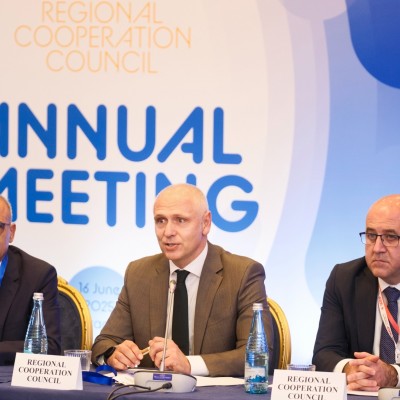ESAP 3 main goal is to promote fair and well-functioning labour markets in the Western Balkans RCC ESAP 3: The Third Phase of the Employment and Social Affairs Platform Project Kicks Off
30 October 2024

ESAP 3 Kick Off Event: Balanced Labour Markets in the Western Balkans: Innovative Solutions for a Sustainable Workforce - Family photo (Photo: RCC/Henri Koci)
Budva - The Employment and Social Affairs Platform 3 (ESAP 3) project, jointly implemented by the Regional Cooperation Council (RCC) and International Labour Organisation (ILO), and financed by the European Union, marked the beginning of its third phase implementation, with the two-day event dubbed “Balanced Labour Markets in the Western Balkans: Innovative Solutions for a Sustainable Workforce” held on 22 – 23 October 2024 in Budva.
In her key-note remarks, Pranvera Kastrati, Head of the Programme Department of the Regional Cooperation Council (RCC) reflected on the second declaration of the Common Regional Market Action Plan, endorsed earlier this month at the Berlin Process Summit, where employment and social affairs were put very high on the agenda for the Western Balkans Six. She emphasized that in that context, the components of ESAP 3 project are highly relevant and important for the region, adding that the success of the project would not be possible without the high involvement and committed cooperation between Western Balkan Six partners.
The goal of the ESAP 3 is to promote fair and well-functioning labour markets in the Western Balkans by advancing the alignment with the EU acquis and implementation of the European Pillar of Social Rights in the areas of undeclared work, health and safety at work and social dialogue, as presented by Ratka Babic, RCC’s ESAP 3 Team Leader, and Ada Huibregtse, ILO’s Chief Technical Advisor. Key figures that illustrate the disparities between our region and the EU, demand our collective focus. Overall unemployment in the Western Balkans Six (WB6) in 2023 was at 12.4%, a striking contrast to the EU's 6.1%, while the female unemployment rate reflects a similar disparity. The most concerning numbers are those of youth unemployment, standing at a sobering 26.9%, nearly double the EU average of 14.5%.
Laura Corrado, Head of International Affairs Unit, at the European Commission’s Directorate-General for Employment, Social Affairs and Inclusion (DG EMPL), in her opening speech reiterated that the EU enlargement process remains the top priority for the European Commission and that all EU institutions stand ready to support the region in the complex path of the EU accession. She added that the importance of the ESAP 3 project lies in addressing different components of effective labour market and social policies, tackling undeclared work, formalisation, approximation of Western Balkans to labour and social standards, fostering social dialogue, and raising standards in occupational safety and health. She concluded that the very positive evaluation of the first two phases of the ESAP project demonstrated its added value and impact.
Beside Ms Kastrati and Ms Corrado, key note remarks have also been delivered by Enrica Chiozza, Head of Sector at Neighbourhood and Enlargement negotiations (DG NEAR) and Lejo Sibbel, Senior Social Dialogue, Labour Law, and International Labour Standards Specialist, ILO.
The conference included the Employment and social outlook in the Western Balkans panel from the RCC ESAP 3 component of the project which highlighted the importance of joint efforts and well-crafted policies to tackle employment formalisation, boost skills development, and support young entrepreneurs across the Western Balkans. It also hosted the session marking the beginning of greater involvement of the region’s Public Employment Services (PES) in the work of the EU PES Network.
The event gathered over 80 representatives from the Western Balkans Six ministries in charge of labour and social issues, labour inspectorates, tax administrations, public employment services, and social partners, as well as representatives of the European Union, partner international organisations and thematic experts.
More info on the ESAP 3 Project www.esap.online/home
ESAP 3 Observatory: www.esap.online/observatory/
***
ESAP 1 - the project’s first phase (2016-2019) has supported six Western Balkan economies in labour market, employment and social policy reforms aimed at increasing employment opportunities for citizens across the region, resulting in stronger capacities of the Western Balkan Six institutions to enhance their performance and tackle reform agendas and alignment with the EU enlargement requirements.
ESAP 2 - the project’s second phase (2020-2024) expanded to cover additional employment and social policy topics of high relevance for the Western Balkans Six including tackling undeclared work and alignment with the EU Acquis and European Pillar of Social Rights. This project phase resulted in established regional networks involving policy-makers and operatives aimed at enhancing performance regarding reform agendas and effectiveness of their institutions in performing core functions.



